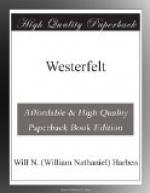Washburn stared blankly at him for an instant, then he said, slowly, “All right.”
“You’d better get it to-night,” added Westerfelt.
“All right, sir. I’ll attend to everything.”
“Cool as a cucumber,” laughed a man. “Next thing you know he’ll give orders ‘bout whar he wants to be buried, an’ what to have cut on his grave-rock.”
The whole gang laughed at this witticism, and started on again. When they had gone about a hundred yards Westerfelt glanced back. He saw Washburn cross the road and enter the blacksmith’s shop, and the next instant the shop was hidden by a sudden turn in the road. They passed the meeting-house and began to ascend the mountain. Here and there along the dark range shone the red fires of chestnut harvesters. The blue smoke hung among the pines, and the air was filled with the odor of burning leaves. They passed a camp—a white-covered wagon, filled with bags of chestnuts, two mules tethered to saplings, and three or four forms in dusky blankets lying round a log fire. As the weird procession passed, the mules drew back on their halters and threw their ears forward, but the bodies at the fire did not stir.
In about twenty minutes the band reached a plateau covered with a matting of heather. They went across it to the edge of a high precipice. It was as perpendicular as a wall. Below lay the valley, its forests of pines and cedars looking like a black lake in the clear moonlight.
“Git down, men, an’ let’s ‘tend to business an’ go back home,” commanded the leader. “I have a hankerin’ atter a hot breakfast.”
Everybody alighted except Westerfelt. The leader touched him with his whip. “Will you git down, or do you want to be drug off like a saddle?”
“May I ask what you intend to do with me?” asked Westerfelt, indifferently.
The leader laughed. “Put some turkey red calico stripes on that broad back o’ yorn, an’ rub in some salt and pepper to cuore it up. We are a-gwine to l’arn you that new settlers cayn’t run this community an’ coolly turn the bluecoats agin us mount’in folks.”
Westerfelt looked down on the masks upturned to him. Only one of the band showed a revolver. Westerfelt believed him to be Toot Wambush. He had not spoken a word, but was one of the two that had ridden close behind him up the mountain. One of the white figures unstrapped a pillow from the back part of his saddle. He held it between his knees and gashed it with a knife.
“By hunkey! they’re white uns,” he grunted, as he took out a handful. “I ’lowed they wus mixed; ef my ole woman knowed I’d tuck a poke uv ’er best goose feathers ter dab on a man she’d get a divorce.”
Two or three laughed behind their masks. Another laugh went round as a short figure returned from the bushes with a bucket of tar which had been left near the road-side.
“Heer’s yore gumstickum.” He dipped a paddle in it and flourished it before Westerfelt, who was still on his horse. “Say, mister, you don’t seem inclined to say anything fer yorese’f; the last man we dressed out fer his weddin’ begged like a whipped child, an’ made no end o’ promises uv good behavior.”




